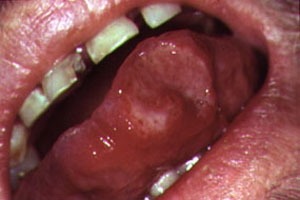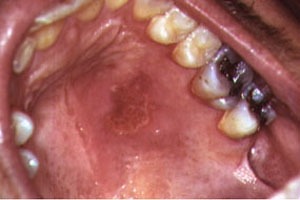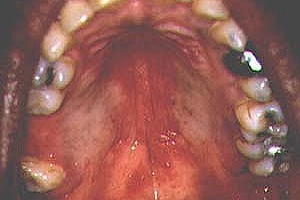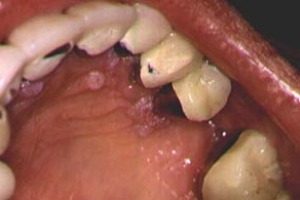HIV/AIDS & Oral Health
On this page
Overview
People with human immunodeficiency virus (HIV), the virus that causes acquired immunodeficiency syndrome (AIDS), are at special risk for oral health problems. Some of the most common oral health problems for people with HIV/AIDS are chronic dry mouth, gum disease (gingivitis), bone loss around the teeth (periodontitis), canker sores, oral warts, fever blisters, thrush (oral candidiasis), hairy leukoplakia (which causes a rough, white patch on the tongue), and tooth decay.
Oral health conditions can be painful, annoying, and can lead to other health problems. Combination antiretroviral therapy, which is used to treat HIV and restore immune system function, has made some oral health problems less common.
Back to topCauses
People with HIV/AIDS have an increased risk for oral health problems because HIV/AIDS weakens the immune system and makes it harder to fight off infection.
Back to topSymptoms
Oral health problems may include:
| Photo | Description | It could be: | What & where? | Painful? | Contagious? | Treatment |
|---|---|---|---|---|---|---|
| Red sores ulcers | Aphthous (AF-thus) ulcers, also known as Canker Sores | Red sores that might also have a yellow-gray film on top. They are usually on the moveable parts of the mouth such as the tongue or inside of the cheeks and lips. | Yes | No | Mild cases – Over-the-counter cream or prescription mouthwash that contains corticosteroids; More severe cases – corticosteroids in a pill form. | |
| Red sores ulcers | Herpes (HER-peez), a viral infection | Red sores usually on the roof of the mouth. They are sometimes on the outside of the lips, where they are called fever blisters. | Sometimes | Yes | Prescription pill can reduce healing time and frequency of outbreaks. | |
| White hairlike growth | Hairy Leukoplakia (Loo-ko-PLAY-key-uh) caused by the Epstein-Barr virus | White patches that do not wipe away; sometimes very thick and “hairlike.” Usually appear on the side of the tongue or sometimes inside the cheeks and lower lip. | Not usually | No | Mild cases – not usually required; More severe cases – a prescription pill that may reduce severity of symptoms. In some severe cases, a pain reliever might also be required. | |
| White or creamy bumpy patches like cottage cheese | Candidiasis (CAN-di-dye-uh-sis), a fungal (yeast) infection, also known as thrush | White or yellowish patches (or can sometimes be red). If wiped away, there will be redness or bleeding underneath. They can appear anywhere in the mouth. | Sometimes, a burning feeling | No | Mild cases – prescription antifungal lozenge or mouthwash; More severe cases – prescription antifungal pills. | |
| Warts | Small, white, gray, or pinkish rough bumps that look like cauliflower. They can appear inside the lips and on other parts of the mouth. | Not usually | Possibly | Inside the mouth – a doctor can remove them surgically or use “cryosurgery” – a way of freezing them off; On the lips – a prescription cream that will wear away the wart. Warts can return after treatment. |
Photos courtesy of Dr. David Reznik, HIVDent.org; and Dr. Jeff Lennox
Back to topTreatment
The most common oral health problems linked with HIV can be treated. Talk with your doctor or dentist about what treatment might work for you.
Back to topHelpful Tips
In addition to the health problems listed in the table, you may experience dry mouth. Dry mouth happens when you don’t have enough saliva, or spit, to keep your mouth wet. Saliva helps you chew and digest food, protects teeth from decay, and prevents infections by controlling bacteria and fungi in the mouth. Without enough saliva, you could develop tooth decay or other infections and might have trouble chewing and swallowing. Your mouth might also feel sticky or dry and have a burning feeling, and you may have cracked, chapped lips.
To help with a dry mouth, try these things:
- Sip water or sugarless drinks often.
- Chew sugarless gum or suck on sugarless hard candy.
- Try mouthwash and toothpaste designed for dry mouth.
- Avoid tobacco.
- Avoid alcohol.
- Avoid salty foods.
- Use a humidifier at night.
Talk to your doctor or dentist about prescribing artificial saliva, which may help keep your mouth moist.
Back to topAdditional Resources
- MedlinePlus: HIV/AIDS and Oral Health
The NIH National Library of Medicine's collection of links to government, professional and nonprofit/voluntary organizations with information on HIV/AIDS and oral health. - NIH: HIV and AIDS: The Basics
Provides general information on HIV and AIDS, including information on HIV prevention; HIV treatment; side effects of HIV medications; HIV and pregnancy; specific populations; opportunistic infections, co-infections, and conditions; and living with HIV. - Centers for Disease Control and Prevention: HIV Basics
Provides information on HIV prevention and testing, HIV and COVID-19, and national statistics on people diagnosed with HIV as well as deaths due to this disease. - HIV/Dent
This website has current information on treatment of HIV/AIDS with a focus on oral complications of HIV.
August 2024





